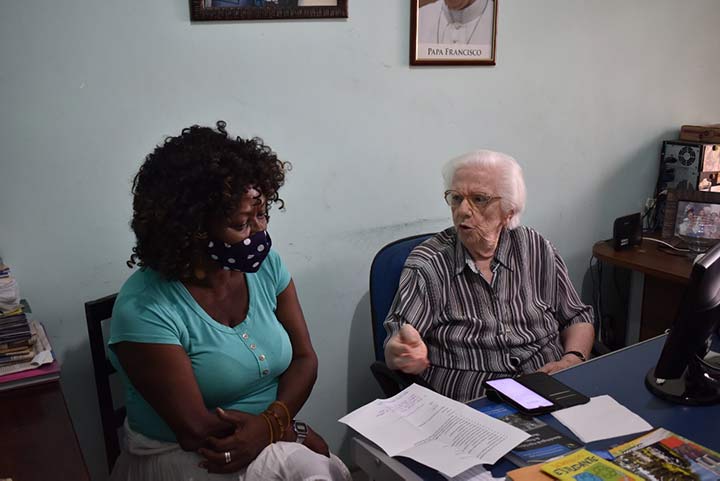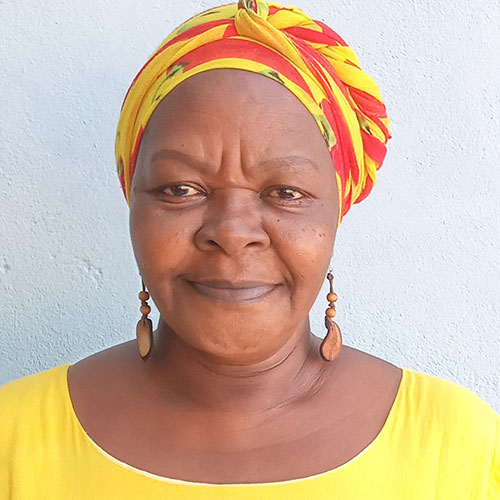Associação Beneficente AMAR fights against poverty and social vulnerability in Rio de Janeiro
The charitable association AMAR has been promoting the development and inclusion of socially vulnerable children and adolescents for over 20 years. Check out!


For 21 years, Associação Beneficente AMAR (AMAR Charitable Association)F has worked tirelessly and lovingly, to defend the rights of children and teenagers that face economic poverty and social vulnerability. It is a Catholic institution, founded in July 2000, by a group of people working in the Archdiocese of Rio de Janeiro and Duque de Caxias-RJ.The founders of the AMAR Association are: Sister Adma Cassab Fadel, Deacon Roberto José dos Santos, Deacon Sebastião Bernardino de Andrade and Mr. Mário Loureiro de Morais Filho.
The AMAR Institution began assisting people experiencing social vulnerability and homeless people. Now, the work has been extended to some communities, strengthening communication with local Residents’ Associations. AMAR was born to continue its founders’ work and personal will to promote equality and human rights.
During a very relaxed and charming interview, Mauro Furlan, Coordinator of the Fundraising Sector, and Sister Adma Cassab Fadel, Vice President, talk about this important work in Rio de Janeiro. Mr. Mauro Furlan reveals that, currently, the major challenges for social projects are raising funds and maintaining them. He regards this practise as an ongoing challenge.


Another challenge is to keep up to date (in two ways): by always having all the documentation up-to-date and by meeting the requirements of funders who, being from other countries such as Italy, Belgium, and Germany, make it necessary for the institution to adapt to the requirements of each of these locations. Besides that, meeting the needs of direct beneficiaries and employees is also challenging. “If there is no harmony, the institution cannot be maintained, it is like a living body. This is how AMAR has been standing for 21 years, which is a victory,” says Mauro Furlan.
Here’s the full interview:
Neuza Nascimento: What are AMAR’s projects?
Mauro Furlan: Today, Reforço Escolar, after school hours, is one of the main projects in the Grajaú neighborhood and in the city of Duque de Caxias. In São Cristóvão, there are professional courses and approaches for street children.
The “Girls From Rio” Project, for girls with social difficulties, is carried out at Casa Dom Helder Câmara, in Grajaú, with weekly meetings on the themes: female empowerment, early pregnancy, sexually transmitted diseases, and the challenges for black women.
The Project Casa de Acolhida Frei Carmelo Cox, located in Vila Isabel-RJ, is the shelter for 20 boys, aged between 7 and 15 years, who were abandoned by their families, under the guidance of the Juvenile Court.
The Distance Sponsorship Project serves children from different neighbourhoods of Rio de Janeiro and Duque de Caxias who live in extreme poverty. They benefit from financial and emotional support, through sponsors linked to the Italian institution MACONDO.
Neuza Nascimento: What is the age group of the beneficiaries?
Mauro Furlan: Knowing the reality of children and teenagers aged 7 to 14 in Reforço Escolar, Associação AMAR has been working for 20 years to prevent school dropout, which typically occurs between the ages of 10 and 12. The service is also extended to the families of more than 280 beneficiaries. The shelter serves young people aged 7 to 14, who are the most vulnerable ages found in street abandonment. The service for 14 to 23-year-olds is more focused on professional training.
Mauro Furlan goes on to say that the process of children and teens from communities entering the projects takes place through communication with residents’ associations or when they are referred by the Social Assistance Reference Centre (CRAS). They also arrive through publicity on social networks or through spontaneous demand. In addition, beneficiaries who already know and participate also call others. And, in the case of the shelter, they arrive with a judge’s order. For spontaneous demand, an interview is carried out (which includes the presence of a responsible adult, depending on age).
Neuza Nascimento: How long do children referred by a judge remain in the project?
Mauro Furlan: They are under the responsibility of the institution until they find a close relative, a substitute family, or return to their original one.
AMAR is always looking for partnerships, and, in addition to projects supported by foreign financiers, they receive donations from Brazilian individuals and legal entities. The Associação AMAR is made up of 40 paid employees, divided into four teams, with sociologists, pedagogical coordinators, social workers, educators, and administrators.
Neuza Nascimento: How was the service during the peak of the COVID-19 pandemic?
Mauro Furlan: In March 2020, we maintained full service, delivery of food handouts, and administration. In September of the same year, we started face-to-face service with small groups. We needed to return because the children had been abandoned bt the closure of schools. The inflow of resources decreased significantly, but there were no layoffs.
More about Sister Adma
Sister Adma Cassab Fadel is very charismatic, and full of vitality and joy. She participated in the process of creating the Statute of Children and Adolescents (ECA), the main legal and regulatory framework for the rights of children and teenagers in Brazil. In 2016, she was honoured as a benevolent citizen with the Pedro Ernesto Medal, by the City Council of Rio de Janeiro. Today, she serves as vice president of Associação AMAR, in addition to being one of its founders. Sister Adma Cassab Fadel, a defender of children’s and adolescents’ rights, also works to protect women’s rights.
Check out an interview about the creation of AMAR below:
“Each of us, the founders, has already worked with homeless children on our own. I am a religious of the Salesian Congregation Dom Bosco, created to welcome young people at risk and in extreme poverty, providing a basis for education, knowledge, instruction, and guidance for life”, says the Sister.
“One day, I met Professor Roberto José dos Santos, who worked at the General Department of Socio-Educational Actions (DEGASE) in Rio de Janeiro and was looking for someone to help with an initiative with homeless children. During the conversation, ideas began to emerge. However, without support, achieving our goals was very difficult. We then began to meet with other people who were already carrying out this work of welcoming and protecting the underprivileged. That’s when we met the Dutch Friar Carmelo Cox.”
Sister Adma explains that he was very upset to see street children around Sala Cecília Meireles, in Lapa. “And, being a foreigner with advanced age and other occupations, I didn’t know how to position myself ahead of the situation. When we spoke to him, we commented on our work, which matched exactly what he needed.”, she says. “He said he was distressed by the children being abandoned. He also said that he didn’t know how to approach them, but that he could finance a job that would help them. It was a very good union because he had the financial power and we could interact. In all my vocational life, that was the happiest encounter I ever had.”
Sister Adma goes on to say: “The biggest challenge was coming across people who didn’t understand the work, didn’t know the reality of those children, and mistreated them for it. And they also treated us badly. I noticed how uncomfortable they felt with the children’s presence, without realising that the young people were not to blame for being in that situation. They were simply abandoned by the family, by the school, and by the government. Making people understand this reality was really our biggest challenge.”
Neuza Nascimento: What does victory mean to you?
Sister Adma: Victory, for me, is an achievement. It is the success of the lives of the boys who were here. The success of each of them – that is victory. I must live the rest of my life on my knees, thanking the Lord for the opportunity to witness this. All the young people I meet again are living with dignity. I live in a house with other elderly sisters, and, the other day, a health team went there to vaccinate us. A young man, a member of this team, came to meet me, calling me by my name. I got scared and asked who he was. He replied, saying that he was one of the boys I had taken in in the past. I was so happy. It was a very special moment! In fact, this is not uncommon, I’ve had many encounters like this, but this was the most recent.
AMAR’s own headquarters is located at Rua Visconde de Santa Isabel, in Grajaú, Rio de Janeiro. AMAR has four centers: Casa Dom Helder Câmara, located in Grajaú; Socio-Educational Center, in São Cristóvão; Casa São Mathias, in Duque de Caxias and the Casa de Acolhida Frei Carmelo Cox, in Vila Isabel.
How to support AMAR
You can join and be a contributing partner through the website www.associacaoamar.org.br, make donations to the campaign hosted on the Benfeitoria page, or you can do it directly at one of AMAR’s offices. Food, clothing, shoes, and hygiene and cleaning materials are accepted. They are also looking for volunteers who want to organise parties and events for the children in foster care. The institution is open to any help.
Everyone is invited to get to know the AMAR Association and see up close the work carried out in favour of children and young people with love and respect.
Their main headquarter is located at Rua Visconde de Santa Isabel, 480, Vila Isabel, Rio de Janeiro, where it is also possible to talk to the Board of Directors and get to know the full extent of this work. Besides that, we can also find Associação AMAR on Instagram and Facebook.



